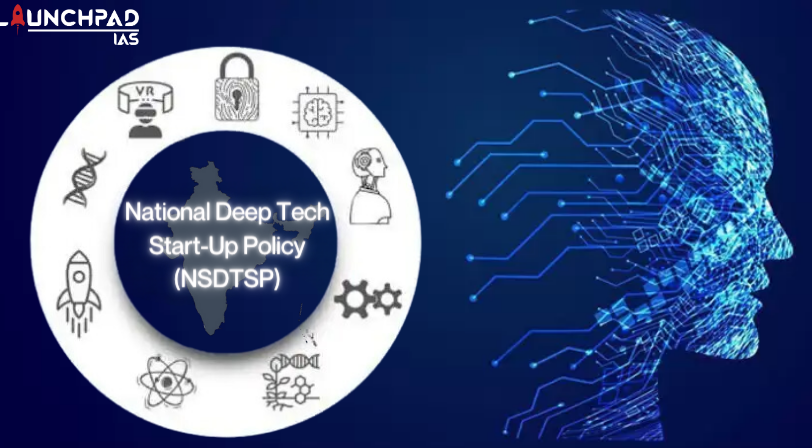What is Deep Tech?
- Deep tech or deep technology refers to a class of start-up businesses that develop new offerings based on tangible engineering innovation or scientific discoveries and advances.
- Deep tech fields like Artificial Intelligence, advanced materials, blockchain, biotechnology, robotics, drones, photonics, and quantum computing are moving more and more quickly from early research to market applications.
Characteristics of Deep Tech
- Impact: The deep tech innovations are very radical and disrupt an existing market or develop a new one. Innovations based on deep tech often change lives, economies, and societies.
- Time & Scale: The time required for deep technology to develop the technology and reach market-ready maturity is way more than shallow technology development (like mobile apps and websites).
- Capital: Deep tech often requires a lot of early-stage funding for research and development, prototyping, validating hypothesis, and technology development.
National Deep Tech Start-Up Policy
- National Deep Tech Start-Up Policy framework aimed at fostering an enabling environment for companies operating in deep tech sectors.
- This policy is a collaborative effort between the Department for Promotion of Industry and Internal Trade and the Office of the Principal Scientific Adviser.
- Objectives of the Policy: The NDTSP is designed to address the specific challenges encountered by technology start-ups and to provide them with a conducive platform to compete and collaborate globally.
- Key Focus Areas: The National Deep Tech Start-Up Policy outlines several key areas that require attention to achieve its objectives:
- Long-term Funding Opportunities: Creating mechanisms for sustained financial support to enable deep tech start-ups to thrive.
- Intellectual Property Rights Regime: Establishing a simplified yet robust framework to protect intellectual property, fostering innovation and confidence among start-ups.
- Tax Incentives: Providing tax benefits to incentivize investment in research and development within the deep tech sector.
- Conducive Regulatory Framework: Developing regulations that support and facilitate the growth of deep tech startups while ensuring compliance and safety.
- Standards and Certifications: Setting industry standards and certifications to ensure quality and reliability in deep tech products and services.
- Talent Nurturing: Investing in the development of skilled professionals and fostering a talent pool conducive to deep tech innovation.
- Industry-Academia Collaboration: Facilitating linkages between industry, research institutions, and educational establishments to promote knowledge exchange and collaboration.
- By addressing these critical areas, the NDTSP aims to lay the groundwork for a robust and sustainable ecosystem that fosters innovation and growth in the deep tech startup landscape.
- National Research Foundation (NRF) Implementation: The government has established National Research Foundation (NRF), which aims to cultivate synergies between different sectors for research advancement.
- It is anticipated that around 70% of the NRF’s funding, totaling Rs. 50,000 crore over five years, will originate from private industry contributions.
Challenges faced by Deep Tech Projects
- High Risk and Long-term Return on Investment: Deep tech projects often require significant upfront investment in research and development, and may take years or decades to reach the market and generate revenue. This makes them less attractive for traditional investors, who prefer lower-risk and shorter-term ventures.
- Scarcity of Specialized Talent: Deep tech projects need highly skilled and experienced researchers, engineers, and entrepreneurs, who are in short supply and high demand. Finding and retaining such talent can be difficult and costly for deep tech startups, especially in emerging markets.
- Lack of Market Readiness: Deep tech projects may face regulatory, ethical, social, or environmental barriers that limit their adoption and scalability. They may also need to educate and convince potential customers and stakeholders about the value and feasibility of their solutions, which can be complex and unfamiliar.
- Insufficient Research Funding in India: Inadequate research funding in India persists despite a target of 2% GDP allocation. While absolute spending on R&D has risen, the proportion relative to GDP has declined, currently standing at 0.65%, well below the global average of 1.8%.
- Skepticism within the Scientific Community: Despite the government’s efforts, skepticism persists within the scientific community. Many doubt the efficacy of relying solely on the private sector for funding research. They argue that government funding remains crucial and that expectations for private investment may be overly optimistic.
- Financial Inadequacy: Despite the government’s focus on innovation, budgetary increments for key departments are modest. The Council of Scientific and Industrial Research (CSIR) and the Department of Space, for example, see marginal increases, while others face budget cuts.
- Bureaucratic Hurdles: Even when funds are available, delays and bureaucratic hurdles often hinder their effective disbursement. Complex administrative procedures contribute to interruptions in project funding, hampering research progress.


